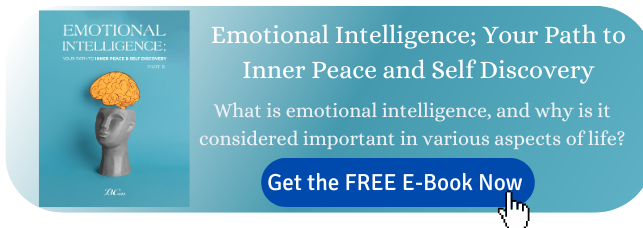Breaking Through the Emotional Intelligence Barriers
According to D. Goleman, only 20% of the performance at work results from cognitive intelligence, and 80% is influenced by emotional intelligence. It is crucial to comprehend what emotional intelligence is.
The ability to recognize, comprehend, use, and control one's emotions and those of others is frequently used to characterize emotional intelligence. To succeed, one must develop emotional intelligence using its five core ideas:1
- Self-awareness
- Self-regulation
- Self-motivation
- Empathy
- Effective relationships
When you are under pressure, recognizing and controlling your emotions is useful. Think of incidents where you had to:
- Deliver and/or accept criticism.
- Observe strict deadlines.
- Deal with difficult individuals.
- Not having the resources or tools required.
- Cope with situations that are always changing.
- Work through failure and setbacks.2
All of the above incidents require high emotional intelligence levels. However, it's not always easy to do so.
So, what might be some of the emotional intelligence blockers?
Defensive Mechanisms3
People utilize defense mechanisms to protect themselves from unpleasant events, acts, or ideas. These psychological techniques may aid people in separating themselves from threats or unpleasant emotions like guilt, shame, anxiety, fear or anger. When this happens, people do not openly share their thoughts, ideas, or feelings. Instead, they adopt behaviors that they might not fully agree with and ditch their beliefs and opinions. Such behaviors are totally the opposite of what emotional intelligence calls for.
For example, your colleague might present an idea to which you might disagree. You decide to voice out your thoughts. To your surprise, your colleague turns hostile. They start attacking you. What your colleague is doing is simply defensive behavior. Your colleague thinks your feedback is a sign they are not competent enough. In an attempt to protect their competency, instead of asking you for clarification, voicing their thoughts to you, thinking objectively about your feedback, or admitting to themselves that the idea is not as good, they jump on you.
All the above examples provide examples of defense mechanisms. When defenses operate, our self-awareness is blocked.
Perception Barriers4
According to the dictionary, perception is a manner of seeing, comprehending, or interpreting something; it is a mental impression. Perspective Barriers in the context of Emotional Intelligence can either be your own view or another person's perception. Unbelievably, because there isn't enough information to create a whole picture, your image of yourself may be a barrier. Many of us have this mental picture of how people view and interact with us daily. Unfortunately, that mental picture is a little bit upside-down or upside-down for many. Asking a reliable friend or coworker might help you understand how others see you. Asking for feedback is challenging but crucial to understand your strengths and places for development in terms of Emotional Intelligence.
Emotional Barriers5
Emotional barriers are mainly internal obstacles. Emotional barriers include emotions like pride, fear of failure, dread of making mistakes, and a sense of unworthiness. Emotional Barriers are typically more difficult to overcome with a little effort and, occasionally, professional assistance because identifying and resolving them requires a good deal of self-reflection and self-awareness.
Bias Barriers
Have you ever entered a boardroom and been shocked to see a female CEO driving the show? Sounds recognizable? You then encountered a bias barrier. Many bias barriers aren't something we consciously consider; instead, they're topics we've never heard of or perspectives we haven't thought about before. Avoiding them will prevent you from achieving Emotional Intelligence. Biases fade over time. They are flexible, and we may take actions to lessen their influence on our attitudes and actions. Another area that involves self-awareness is overcoming bias. You can do this through self-reflection or a test to uncover your biases.
1 Future Work Hub, 31 Jan 2020, Aneta Buckthought, Emotional Intelligence: How to overcome the upcoming challenges regarding the future of work, Accessed 16 Jan 2023, https://www.futureofworkhub.info/comment/2020/1/31/emotional-intelligence-how-to-overcome-the-upcoming-challenges-regarding-the-future-of-work
2World Wide Technology, 7 Sept 2021, Randi Still, Sometimes You Are Your Biggest EMOTIONAL INTELLIGENCE Challenge, Accessed 16 Jan 2023, https://www.wwt.com/article/sometimes-you-are-your-biggest-Emotional Intelligence-challenge
3 THE, 19 Oct 2021, Erecting Up the Defense Walls, Accessed 16 Jan 2023, https://thehumanelement.bconglobal.com/resources/erecting-up-the-defense-walls-1
4World Wide Technology, 7 Sept 2021, Randi Still, Sometimes You Are Your Biggest EMOTIONAL INTELLIGENCE Challenge, Accessed 16 Jan 2023, https://www.wwt.com/article/sometimes-you-are-your-biggest-Emotional Intelligence-challenge
5 World Wide Technology, 7 Sept 2021, Randi Still, Sometimes You Are Your Biggest EMOTIONAL INTELLIGENCE Challenge, Accessed 16 Jan 2023,https://www.wwt.com/article/sometimes-you-are-your-biggest-Emotional Intelligence-challenge
6World Wide Technology, 7 Sept 2021, Randi Still, Sometimes You Are Your Biggest EMOTIONAL INTELLIGENCE Challenge, Accessed 16 Jan 2023, https://www.wwt.com/article/sometimes-you-are-your-biggest-Emotional Intelligence-challenge
For more about this topic, download our latest book " Emotional Intelligence: Your Path to Inner Peace and Self Discovery Part2" for FREE:
